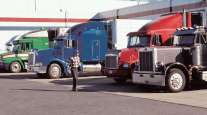Senior Reporter
Werner’s Revenue, Earnings Improve in Second Quarter

Werner Enterprises announced improvements in earnings and revenue for the second quarter in a financial report released July 23.
The Omaha, Neb.-based company said second-quarter revenue rose 19% to $619.1 million, compared with $519.5 million for the year-ago period. Werner said its net income was $38.2 million, up 65% from $23.2 million in 2017. The company’s operating income jumped 38% to nearly $50.8 million, compared with $36.9 million in the second quarter of 2017.
Earnings per diluted share rose to 53 cents in the second quarter, compared with 32 cents during the same period in 2017, a year-to-year increase of 65%. The result beat Wall Street analyst expectations of 49 cents per diluted share, according to Zacks Investment Research.

Leathers
In an interview with Transport Topics, Werner CEO Derek Leathers said he was pleased with the company’s second-quarter performance.
“Big picture, I think it is a representation of our continued turnaround story here in terms of improving results, both top and bottom line,” he said. “I’m just proud of our associates for all of the work they put in, all quarter long to achieve them.”
In the release, the company noted that freight demand was consistent across every month in the quarter and attributed some of its 2Q gains to higher demand in its One-Way Truckload fleet. Werner added that average revenues per tractor increased 9.5% from the same period in 2017.
Despite some concerns, Leathers said he is optimistic 2018 will continue to be a strong year of steady growth.
“We obviously have an eye towards the ongoing trade and tariff conversations and potential impact in the short term, that those could have,” Leathers said. “But overall, the economy is strong, capacity is still constrained, the driver shortage is pronounced and we think the carriers that operate best in that environment — and are to contain their costs while taking care of their drivers — will win. And we like our position.”
At the end of the quarter, Werner had 7,700 trucks in its truckload services segment, compared with 7,315 in 2017. Of those, 7,075 are company units while 625 belong to independent contractors. The company had 6,615 company units and 700 independent contractors in 2017. The average age of its fleet is 1.9 years.
Due to the increase in the number of company-owned trucks, and the decrease in owner-operator vehicles, company truck miles increased by nearly 5 million and miles driven by independents declined by about 4 million.
Werner said the tight driver recruiting market continues to be “increasingly difficult” with fewer new drivers finishing driver training schools and increased competition for those that earn their commercial driver licenses. The company added that the increasing average age of experienced drivers, a low unemployment rate and the electronic logging device regulation are also factors. However, without disclosing retention figures, Werner said its second-quarter driver turnover percentage is the lowest it has been in 20 years.
“We have increased pay over 15% in the last two years and then this year alone, we have already implemented over $28 million in pay raises,” Leathers said. “We want our drivers to be paid for the work they do, and we want them to be able to support a family, buy a home and have a solid lifestyle. And we believe today, with both the combination of pay and miles, what we’re able to produce is giving the drivers that opportunity.”




